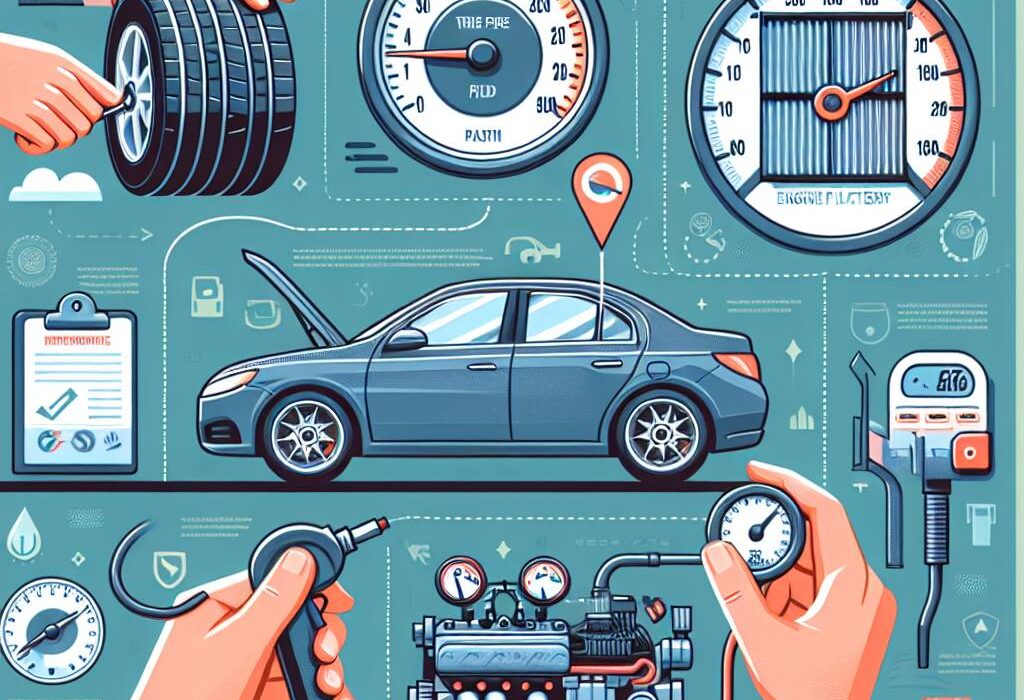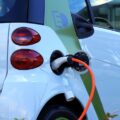Discover essential tips for maximizing fuel efficiency, from tire pressure and oil choice to driving habits and routine car maintenance.In an era where every drop of fuel counts, maintaining your car for maximum fuel efficiency has never been more critical. A well-tuned vehicle not only saves you money at the pump but also contributes to a healthier environment by reducing carbon emissions. In this article, we will explore essential practices that can enhance your car’s fuel economy, from regularly checking tire pressure and choosing the right oil to understanding the importance of engine tune-ups. Additionally, we’ll delve into how your driving habits can impact fuel efficiency and provide practical routine maintenance tips. With these insights, you can ensure that your vehicle runs smoothly and efficiently, giving you peace of mind while you hit the road. Let’s get started on the journey to optimizing your car’s performance and longevity!
Regularly Check Tire Pressure For Better Fuel Efficiency
Maintaining proper tire pressure is crucial for enhancing your vehicle’s fuel efficiency. Under-inflated tires can lead to increased rolling resistance, which requires more energy (and thus more fuel) to maintain speed. Conversely, over-inflated tires can also negatively affect fuel efficiency and may result in uneven tire wear.
Here are some key points to consider when checking your tire pressure:
| Action | Frequency | Benefits |
|---|---|---|
| Check Tire Pressure | Monthly & Before Long Trips | Improved Fuel Economy, Better Handling |
| Inspect for Wear and Damage | Every 6 Months | Safety and Longevity of Tires |
| Rotate Tires | Every 5,000-7,500 Miles | Promotes Even Wear |
To ensure that you’re maintaining fuel efficiency through proper tire management, follow these steps:
- Utilize a Reliable Gauge: Invest in a good-quality tire pressure gauge to ensure accurate readings.
- Know Your Vehicle’s Specifications: Refer to your vehicle’s manual or the sticker usually located in the driver’s door jamb for the recommended tire pressure.
- Check When Cold: Always check tire pressure when the tires are cold, as heat builds up from driving can give inaccurate readings.
- Maintain Regular Maintenance: Periodically check tire alignment and balance, which can affect tire pressure and overall performance.
By consistently monitoring and adjusting your tire pressure, you can significantly contribute to the maintaining fuel efficiency of your vehicle, ultimately saving you money at the pump while extending the life of your tires.
Understanding The Importance Of Engine Tune-Ups
Engine tune-ups play a crucial role in maintaining fuel efficiency. Regularly scheduled tune-ups help ensure that your vehicle’s engine is running at its optimal performance level. During a tune-up, various components are inspected, adjusted, or replaced, which can lead to significant improvements in fuel economy.
One of the key aspects of tune-ups is the adjustment of fuel injectors and ignition systems. Over time, these components may become less effective, leading to improper fuel combustion. When the fuel injection system operates efficiently, it delivers the right amount of fuel at the correct moment, enhancing the overall combustion process and contributing to better fuel efficiency.
Additionally, a clean and well-maintained engine produces fewer emissions. During a tune-up, technicians check and replace worn-out spark plugs, clean the throttle body, and assess the entire engine performance. This proactive maintenance not only helps in achieving optimal fuel efficiency but also protects the environment by reducing harmful emissions.
Neglecting engine tune-ups can lead to a drop in fuel economy, more frequent refueling, and potentially costly repairs due to engine wear and tear. To reap the benefits of maintaining fuel efficiency, it is advisable to follow your vehicle’s recommended service schedule and seek professional assistance when necessary.
Choosing The Right Oil To Enhance Fuel Economy
One critical aspect of maintaining fuel efficiency is selecting the appropriate motor oil for your vehicle. The right oil not only protects your engine but also contributes to better performance and fuel economy. Here are some factors to consider when choosing motor oil:
| Oil Type | Benefits |
|---|---|
| Synthetic Oil | Offers superior lubrication and reduces friction, which can enhance fuel economy and engine performance. |
| Conventional Oil | Generally less expensive, but may not provide the same level of protection and efficiency as synthetic oils. |
| High-Mileage Oil | Formulated for vehicles with over 75,000 miles, these oils can help reduce oil consumption and improve fuel economy. |
Additionally, be sure to follow the manufacturer’s recommendations regarding oil viscosity. Using oil with a lower viscosity can lead to reduced friction, which often translates to improved fuel efficiency. However, it’s important to strike a balance as using oil that’s too thin for your engine could lead to inadequate protection.
Regularly changing your oil according to your vehicle’s maintenance schedule is another key practice in maintaining fuel efficiency. Old or dirty oil can increase engine drag and negatively impact fuel consumption.
Choosing the right oil and following a proper oil change schedule are vital steps in enhancing your vehicle’s fuel economy while keeping it in optimal condition.
Maintaining Fuel Efficiency Through Proper Air Filter Care
One crucial yet often overlooked aspect of maintaining fuel efficiency is ensuring that your car’s air filter is clean and in good condition. The air filter plays a vital role in maintaining the engine’s performance, as it prevents dirt and debris from entering the engine. A clean air filter allows for optimal airflow, improving fuel combustion and enhancing overall engine efficiency.
When the air filter is clogged or dirty, it restricts airflow, leading to an imbalance in the air-fuel mixture. This can result in the engine working harder than necessary, leading to increased fuel consumption. To optimize fuel efficiency, follow these simple air filter maintenance tips:
- Check the owner’s manual for recommended air filter replacement intervals.
- Inspect the air filter regularly for dirt and contamination, especially if you drive in dusty conditions.
- Replace or clean the air filter as needed to ensure efficient airflow.
- Consider using high-performance air filters that offer better filtration and airflow.
Regularly checking and maintaining your air filter is a simple yet effective way to promote maintaining fuel efficiency. By ensuring a clean air filter, you’ll not only enhance your vehicle’s performance but also contribute to longer engine life and reduced environmental impact.
How Driving Habits Impact Fuel Efficiency
Your driving habits play a crucial role in maintaining fuel efficiency in your vehicle. Certain driving behaviors can lead to increased fuel consumption, while others can help reduce it. Here are some key factors to consider:
- Aggressive Driving: Rapid acceleration and hard braking can significantly decrease fuel efficiency. Smooth acceleration and deceleration not only save fuel but also enhance the lifespan of your vehicle.
- Speeding: Driving at excessive speeds increases drag and resistance against your vehicle, leading to higher fuel consumption. Most cars are most efficient when traveling between 45-65 mph.
- Idling: Keeping your engine running while parked wastes fuel. If you anticipate being stopped for more than a minute or two, consider turning the engine off.
- Frequent Short Trips: Making short trips where the engine doesn’t reach its optimal operating temperature can lead to inefficient fuel usage. Consolidate errands when possible to allow your engine to run efficiently.
- Use of Air Conditioning: Air conditioning can put extra load on the engine, reducing your vehicle’s fuel economy. Use it judiciously, and consider using the vehicle’s ventilation system instead, especially at lower speeds.
By being mindful of your driving habits, you can significantly improve your vehicle’s performance and maintain fuel efficiency. Small changes can lead to substantial savings and a reduced environmental footprint over time.
Routine Car Maintenance Tips For Maximum Fuel Efficiency
Maintaining fuel efficiency is essential not only for saving money at the pump but also for prolonging the life of your vehicle. Here are some routine car maintenance tips that can help you achieve optimal maintaining fuel efficiency:
- Regular Oil Changes: Keep your engine running smoothly by changing your oil as recommended. Fresh oil ensures better lubrication and improves fuel consumption.
- Inspect and Replace the Air Filter: A clean air filter is crucial for proper air intake. Replace it regularly to enhance engine performance and fuel efficiency.
- Keep Your engine in Tune: Regular engine tune-ups can significantly boost your car’s performance and efficiency. This includes checking ignition systems and fuel injectors.
- Monitor Tire Condition: Ensure tires are in good condition with adequate tread depth. Consider rotating them regularly to promote even wear.
- Fuel System Cleaning: Periodically cleaning your fuel system can help maintain optimal fuel delivery and improve combustion efficiency.
- Check the Battery: A weak battery can affect engine performance. Ensure your battery is in good condition and replace it if necessary.
Implementing these maintenance tips regularly can significantly contribute to maintaining fuel efficiency and keeping your vehicle running at its best. By investing a little time and effort into routine checks, you can enjoy better fuel economy and a smoother driving experience.
Frequently Asked Questions
Why is maintaining my car important for fuel efficiency?
Regular maintenance helps to ensure that your engine runs smoothly, improving its performance and fuel efficiency over time.
What maintenance tasks can I perform to improve fuel efficiency?
Key tasks include checking and changing the oil, maintaining proper tire pressure, replacing air filters, and ensuring the fuel system is clean.
How often should I check my tire pressure?
It’s advisable to check your tire pressure at least once a month, and before long trips, to ensure they are inflated to the manufacturer’s recommended levels.
Can a dirty air filter affect fuel efficiency?
Yes, a dirty air filter can restrict airflow to the engine, causing it to work harder and consume more fuel, thus reducing overall efficiency.
How do spark plugs impact fuel efficiency?
Worn or dirty spark plugs can lead to misfires and inefficient combustion, which negatively affects fuel efficiency. Replacing them regularly helps maintain optimal performance.
What role does regular oil change play in fuel efficiency?
Regular oil changes keep the engine lubricated and operating smoothly, which can enhance efficiency and reduce fuel consumption.
Are there any specific driving habits that can improve fuel efficiency?
Yes, adopting smooth acceleration and braking, avoiding excessive idling, and driving at moderate speeds can significantly enhance fuel efficiency.










